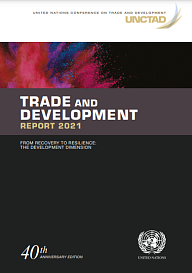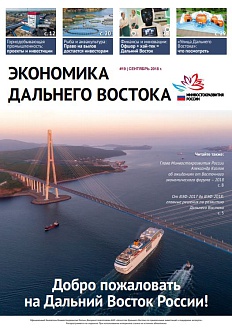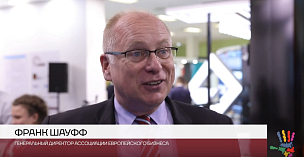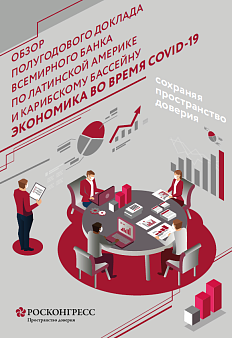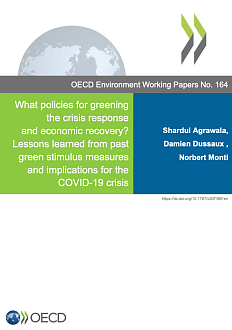This report by UNCTAD deals with global trends in economy, trade, and sustainable development.
The Roscongress Foundation presents the salient points of the publication accompanied by fragments of broadcasts of relevant panel discussions from the business programme of international events held by the Roscongress Foundation.
The world is faced with decelerating global economy, uneven regional performance, and growing indebtedness.
Assuming no further shocks, global growth is projected to reach 5.3 per cent in 2021, decelerating somewhat to 3.6 per cent in 2022. These figures are the result of demand stimulus in advanced economies and economies issuing global currencies, but still reflect incomplete reactivation of the productive capacity idled in the recession of 2020. Growth performance by region is very uneven. Only developed countries show the expected growth spurt, while many developing economies will remain below pre-pandemic averages. Indebtedness has been growing across most regions since the start of the pandemic. With the exception of China and some oil exporting economies, debt burdens are too high and export revenues too low across the developing world.
The authors of the report think that it is still unclear whether the current performance of the world economy will be sufficiently strong to recover pre-Covid trends. In 2020-22, the global economy faces a cumulative income loss of about USD 13 trillion. According to UNCTAD estimates, if the global economy were to grow as in the early 2000s (approximately 3.5 per cent per year) it would return to its pre-pandemic trend only by 2030. Considering that global growth in 2017–2019 was already insufficient to reach the Sustainable Development Goals, reaching them in the current conditions requires unprecedented action.
UNCTAD analysts believe that the biggest threat to global recovery is a possible repeat of the post-2008 playbook, and a return to ‘normalcy’ in economic policymaking. No significant attempt has been made to support development, to reorient the global financial and payments system towards productive investment, to establish a debt workout mechanism, and to make trade more conducive to sustainable development.
Climate change continues to impact economies, with developing economies hit the hardest.
The consequences of rising global temperatures reflect, and are amplified by, existing structural inequalities within and across countries. The historical responsibility for global greenhouse gas emissions (the principal cause of global warming) lies squarely with the developed nations, which account for around two-thirds of the cumulative total of emissions in the atmosphere compared with just 3 per cent for Africa. And while some developing economies like Brazil, China, India, and South Africa have rising emissions, on a per capita basis they are still behind advanced countries and even the consumption-related emissions of their richest citizens are below counterparts in advanced economies. For many developing countries rising global temperatures are compounding a vicious development cycle that has been constraining resource mobilization, widening income gaps and weakening state capacities for decades. Economies with underfunded health care systems, mal-developed infrastructure, undiversified production base and missing state institutions are more exposed not only to potentially large-scale environmental shocks but also a more permanent state of economic stress as a result of climate impacts.
Diversification is essential for securing sustainable development.
The authors of the report state that tackling current global challenges like climate adaptation requires a new vision of common goals rather than emphasizing the avoidance of risks and worst-case scenarios that emerge from current circumstances. According to UNCTAD analysts, the only lasting solution is to reduce the dependence of developing countries on a small number of climate sensitive activities through a process of structural transformation that can establish more resilient economies. It’s necessary to move away from the core priority of de-risking and centre instead on an integrated, system-based vision that can deliver socio-economic resilience and diversified economies. This, in turn, requires the institutional capacity of a developmental State, equipped with greener industrial policies that are critical to advancing such an agenda.
Gain more insights about trade and economic development in the Trade policy and Economic progress sections of the Roscongress Information and Analytical System, and about ecology and sustainability in the Climate Change and Sustainable Development sections.


